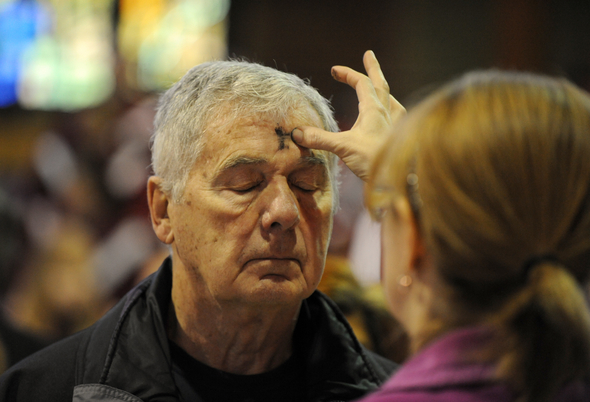For Christians, Lent is a time to reflect and reconnect on a spiritual journey

John McKeon of Ann Arbor has ashes smeared on his forehead at St. Francis of Assisi Catholic Church in Ann Arbor during Ash Wednesday Mass Wednesday morning.
Lon Horwedel | AnnArbor.com
Have you ever wondered why some people bother to smudge ashes on their foreheads or “give up” something good for Lent? This six-week period of prayer and fasting began yesterday, Ash Wednesday, for many Christians.
For me, the season of Lent brings chocolate and cheese enchiladas to mind. Through my New Mexico childhood lens, Lent meant six weeks of denying oneself something good (chocolate) and eating meat-free (enchiladas) on Fridays. I didn’t quite understand the purpose; it just seemed like one way to make Easter Sunday a little more joyful.
As an adult, I still have many questions about the liturgical calendar, but I have grown to appreciate its rhythms. In his book “Our Lent: Things We Carry,” David Crumm calls Lent “the perfect, untarnished blend of religious tradition and spiritual adventure” to prepare our hearts, minds and daily lives for a pilgrimage of discovery.
According to Christian tradition, Ash Wednesday marks the beginning of Lent, a six-week period of prayer, fasting and acts of charity prior to Easter. Although Ash Wednesday and Lent are typically considered Catholic observances, Protestant participation in Lent’s spiritual disciplines is a growing trend.
What do ashes have to do with the season? Ashes and dust were common symbols of mortality, mourning or penance in ancient tradition, as referenced in both the Hebrew and New Testament scriptures, explains American Catholic.org.
As early as the 4th century, churches sprinkled ashes as part of a ritual for public penance at the start of Lent. Pope Urban II (1088-1099) recommended the custom to all churches, and the practice of burning palm branches from the previous Palm Sunday for Ash Wednesday began in the 12th century, according to the American Catholic article.
The fasting discipline was originally for new Christians preparing for baptism, but it became a way for all church faithful to commemorate Jesus' suffering. Current Catholic expectations are summed up on Ann Arbor’s St. Thomas the Apostle Catholic Church website:
“Catholics between the ages of 18 and 59 are obliged to fast on Ash Wednesday and Good Friday. In addition, all Catholics 14 years old and older must abstain from meat on Ash Wednesday, Good Friday and all the Fridays of Lent.
Fasting as explained by the U.S. bishops means partaking of only one full meal. Some food (not equaling another full meal) is permitted at breakfast and around midday or in the evening—depending on when a person chooses to eat the main or full meal.”Lent observation varies in Protestant churches, with individual participation primarily optional. According to the Christian Resource Institute, “Lent has not been well observed in much of evangelical Christianity, largely because it was associated with 'high church' liturgical worship that some churches were eager to reject,” but today, “many churches are now recovering aspects of a larger Christian tradition as a means to refocus on spirituality in a culture that is increasingly secular.”
I asked several friends and colleagues about their Lenten experiences.
Lisa Hirsch, AnnArbor.com contributor and mother of three, said she has learned to love the Lenten season. On the busy treadmill of life, people don’t often take time to reflect, she explained. Hirsch described Lent as “a gift — an opportunity to stop and re-evaluate where I am in my relationship with God.”
The spiritual disciplines of prayer, fasting, and charity help her refocus each year. “Regular prayer brings me closer to God and helps listen to where God is guiding me,” Hirsch said.
Fasting can mean different things to different people. Hirsch finds that eating simple meals makes her more mindful and appreciative of the good things she has. “It helps me realize how abundantly we are blessed,” Hirsch says, “and raises my awareness — and solidarity with — people who don’t have enough.”
The practice of fasting also sheds a light on Jesus’ temptation and suffering, Hirsch noted: “His sacrifice was so much bigger than mine.” The awareness brought by fasting leads right into giving to those in need. St. Mary Student Parish, where Hirsch attends, participates in Catholic Social Services’ Operation Rice Bowl, a simple way to facilitate prayer, fasting and charitable giving.
Instead of abstaining from food, others use the Lenten season as an opportunity to refrain from a bad habit or pick up a positive one. My friends have given up alcohol, morning talk shows, “eating out of packages,” or multitasking for Lent.
Others committed to adding something positive to their regular routines, such as a performing a daily act of kindness or phoning a friend or family member once per week. The positive actions require a little more creativity, said Caren Matteucci, but “somehow seem more satisfying.”
Like the fasting periods observed by many world religions, Lent, for many Christians, is an opportunity to slow down, reflect and appreciate what they already have.
Pam Stout coordinates Faith and Parenting coverage for AnnArbor.com. She can be reached at pamstout@annarbor.com.


Comments
REBBAPRAGADA
Wed, Mar 23, 2011 : 7:40 p.m.
Man is a created being and hence man exists as a moral, and spiritual being. Man comes into existence because of God-Connection and during his entire life journey, during all stages from that of a single cell, growth and development as an embryo, fetus, infancy, boyhood, adulthood, and old age, man exists because of the fact of God-Connection. Man is energy dependent and to exist he needs to draw energy from his environment. God-Connection describes this relationship, partnership, association, or connection between energy dependent entity and his energy provider. This is a great season to remember the fact of Connection.